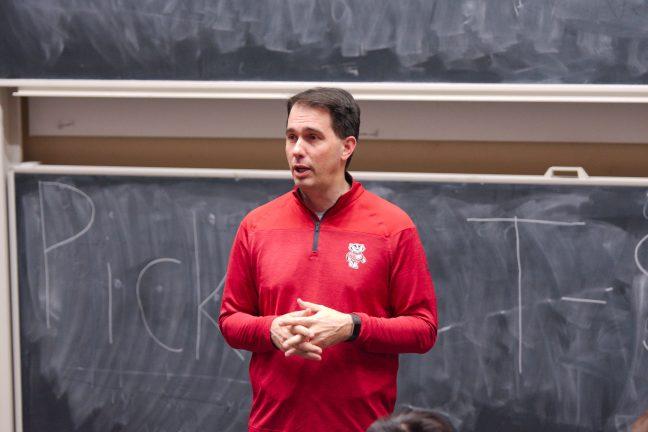Gov. Scott Walker is currently touring the state to propose a package of welfare reforms, set to be enacted January 2019. The package, which includes ten Senate Bills, proposes increased drug testing of welfare recipients, including the implementation of drug testing for all those vying for public housing, as well as increased work requirements for food stamp recipients.
The proposals also stipulate an extension of the work requirements to parents with school-age children, who were previously exempt. Under the new bills, all able-bodied adults, including those with children aged 6-17, would be required to work 30 hours per week in order to be eligible for food stamps.
Sen. LaTonya Johnson, D-Milwaukee, argued, “I believe it is morally unfair and unjust to threaten reduced access to food and shelter for low-income families with children.” And she is right. Given that more than 60 percent of FoodShare beneficiaries are families with minors in them, reducing allocations for non-compliant adults with children would be tantamount to reducing the allocation for the entire household and in turn, the children.
The governor’s office specified, “any sanctions for noncompliance would be partial, only affecting the noncompliant adult’s portion of the allotment.” But FoodShare are allocated by household, and the governor’s office has failed to outline specific plans to implement these sanctions in such a way that would not impact the children.
Scott Manley, a Wisconsin lobbyist, lauded Walker’s proposals, boasting, “Gov. Walker’s proposed reforms would actually incentivize work while making sure our government is still providing a hand up to those in need.”
But Rep. Lisa Subeck, D-Madison, said the issue is not that recipients aren’t working — the majority of able-bodied adults are working, but are unable to make a livable wage. The bigger issues, she explained “is about the people in this state who are working hard every day and are still living paycheck to paycheck and still need this extra help in order to make ends meet.”
Massachusetts Institute of Technology outlines three baselines for income: poverty wage, minimum wage and a living wage. Poverty wage is defined as the amount of income needed to make to stay above the poverty line, while the living wage is “a market-based approach that draws upon geographically specific expenditure data related to a family’s likely minimum food, child care, health insurance, housing, transportation and other basic necessities.”
The minimum wage in Wisconsin sits at $7.25 per hour, which, for someone working full time, comes out to about $15,000 of annual income. Based on data compiled by MIT, $7.25 is just barely a high enough wage to keep one single adult above the poverty line. The livable wage for a single adult was calculated to be about $11.00 per hour. Additionally, Wisconsin’s current minimum wage isn’t even enough to keep one single parent with two kids out of poverty — this wage would need to be $9.00 per hour.
According to the 2017 U.S. Census Bureau, there are about 11,667,000 single-parent households in the U.S. Of these, 35.6 percent were living in poverty, and 31.6 percent were food insecure, but 72.5 percent were employed for all or part of the year. This means there was a significant population of single parents who were employed but were still poor and/or food insecure.
With unemployment in Wisconsin at just 3.4 percent, but poverty at 12.8 percent, it is clear that just working is not enough financial support for Wisconsin recipients. Such a low unemployment rate means the labor market is becoming increasingly competitive, meaning it is harder for people with long bouts of unemployment to find jobs. Given that finding a job is already so hard, people who do manage to find jobs shouldn’t then still be struggling financially.
If Wisconsin wants to support welfare recipients enough to help people establish financial independence, the governor’s office, first and foremost, needs to commit to raising the minimum wage. If someone is working full time at minimum wage, they should be able to live more comfortably than just paycheck to paycheck.
Instead of spending money on unnecessary drug testing, we should be working to raise the minimum wage and establish beneficial programs that will help Wisconsin residents establish living wages for their families. If we do that, then families will actually be able to establish independence from welfare, as opposed to continuing around the poverty cycle. In an interview with Wisconsin Public Radio, Milwaukee resident and welfare recipient Bianca Shaw said, “I’ve picked myself up by the bootstraps time and time again, and I’ll tell you making the decision to break a generational cycle of poverty and work myself off benefits is not as easy a task as you seem to think it is.”
This new set of welfare reform bills will do nothing to break that cycle. It will instead continue the culture of humiliation of welfare recipients, punishment of those unable to find a job in the competitive job market and creation of insurmountable barriers for single parents — especially single mothers — who make up 80 percent of single-family households.
The most effective way to break this cycle is, indubitably, raising the minimum wage to a point where families are able to establish financial independence. After all, no one actually wants to have to be on welfare. But the solution is not to discriminately kick people off — the solution is to build people up and aid them in creating a sustainable life for themselves and their families.
Cait Gibbons (cgibbons3@wisc.edu) is a sophomore majoring in Chinese and statistics.


